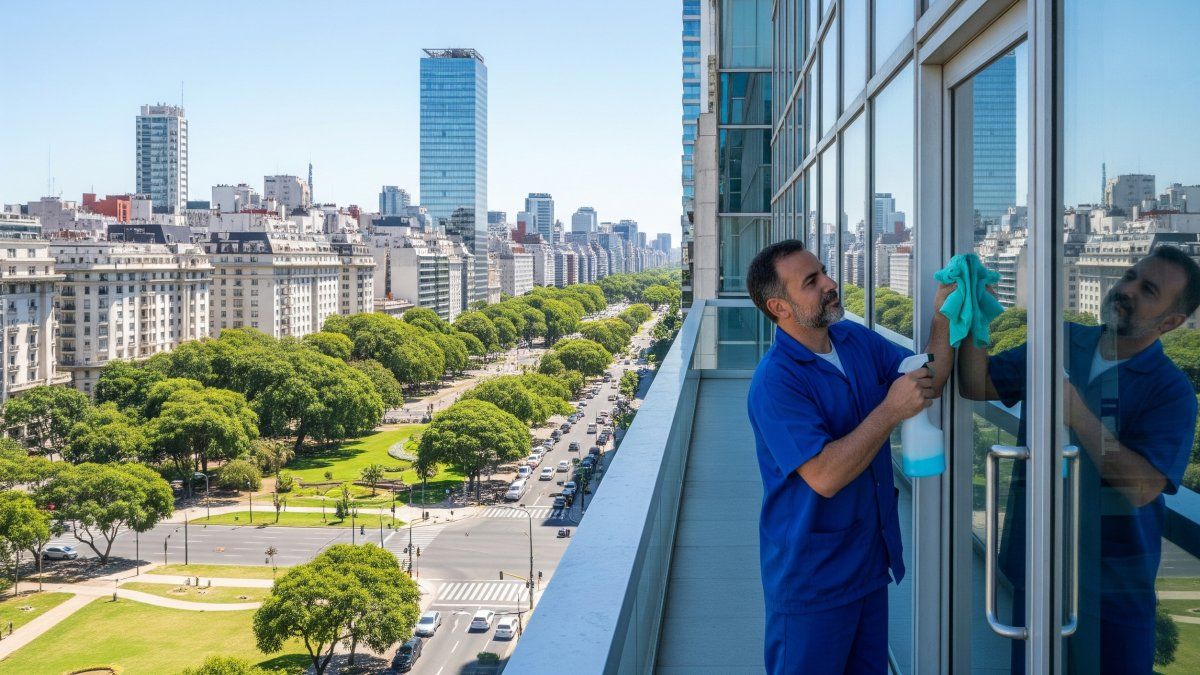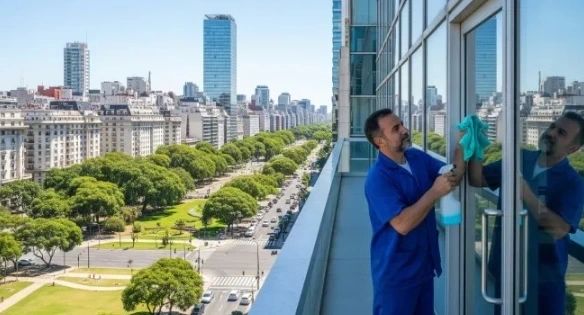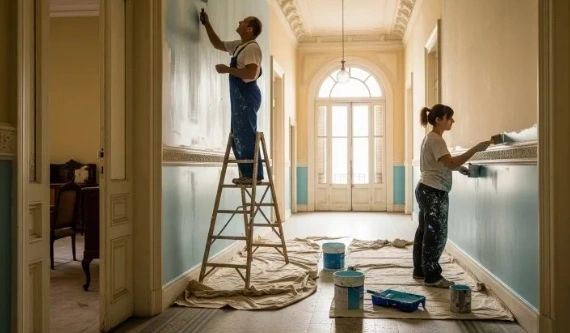BuySellBA
Administrator
Battle Over HOA Fees: Delinquency Hits Buildings With a 17% Average - Ambito Financiero

Source:

 www.ambito.com
www.ambito.com
September 01, 2025
By Josee Luis Cieri
Constantly rising costs are putting consortiums' finances at risk. An analysis of the factors impacting fees and the high debt ratio.

A caretaker performs exterior cleaning tasks. With rising default rates, consortia are unable to maintain a sound financial balance.
The country's delinquency rate for utility bills has averaged 17% this year, with brief fluctuations in recent months. This figure, while lower than the historical average of around 20%, represents a significant burden on the economy of residential communities. The picture shows a particular difference: late payments are slightly higher in gated communities than in apartment buildings .
The data comes from a survey of 200,000 units, both in buildings and gated communities, across the country, conducted by Octavo Piso, an online platform for condominium management . The properties analyzed are located in all 23 provinces, with the highest number of cases in the City of Buenos Aires and Greater Buenos Aires (GBA) on average.
Already in the course of 2025, the number returned to 16% in January, February, and March, rose to 17% in the following two months, and returned to 16% in June.
Payment delays for expenses are slightly higher in gated communities than in buildings . While in apartments, the default rate remained between 15% and 16%, in country clubs and gated communities, it ranged between 17% and 18%, with a significant peak of 26% last December.
The aforementioned delinquency levels are below Argentina's historical average of around 20%. There were exceptional peaks, such as in April 2020, in the midst of the COVID-19 lockdown, when the delinquency rate was 39.74%. In 2001, at the height of the crisis following the fall of the Alliance government, it exceeded 45%.

Painters work in the common areas of a building's lobby. If the arrears increase, it's difficult to have funds for preventative maintenance.
For Martín Eliçagaray , a specialist in technology applied to horizontal property and founder of Simple Solutions, this increase has created a critical situation. “There are many families who can no longer afford this expense. Community living is becoming increasingly difficult, because when expenses exceed a certain threshold, they cease to be an additional payment and become a burden almost as heavy as rent or a loan payment,” he explained.
It also highlights that this economic pressure creates tension between owners and tenants, affects coexistence within buildings, and, in the most critical cases, ends up jeopardizing basic maintenance and security services that depend on these monthly contributions.
Late payment of expenses not only impacts consortiums and the day-to-day management of buildings; it also becomes a key factor when analyzing the rental market in Buenos Aires. For tenants and owners, the weight of expenses can determine the viability of a contract and, in many cases, explain why certain units remain empty or why rental prices are becoming increasingly difficult to afford.
He also emphasizes the value of technology as an ally of efficiency : "There are resources already available that help reduce costs, such as motion sensors, LED lighting, timers, and pump and boiler automation. These are investments that pay for themselves quickly and generate sustainable savings."
Another strategy he recommends is reviewing the service delivery model. “Outsourcing can be a good decision if done right. For example, hiring a cleaning or security company can be more cost-effective and efficient than maintaining permanent staff,” Eliçagaray explained.
He concluded: “The biggest mistake is indifference. If owners don't get involved, they end up paying more for services they don't control. We must be brave enough to ask questions, make proposals, and vote. It's not just about managing money, but about caring for the building like a house.”
www.buysellba.com

Source:

Batalla por las expensas: la morosidad castiga a los consorcios con un promedio del 17%
El aumento constante de costos pone en jaque la economía de los consorcios. Un análisis de los factores que impactan en las cuotas y el alto índice de deuda.
September 01, 2025
By Josee Luis Cieri
Constantly rising costs are putting consortiums' finances at risk. An analysis of the factors impacting fees and the high debt ratio.

A caretaker performs exterior cleaning tasks. With rising default rates, consortia are unable to maintain a sound financial balance.
The country's delinquency rate for utility bills has averaged 17% this year, with brief fluctuations in recent months. This figure, while lower than the historical average of around 20%, represents a significant burden on the economy of residential communities. The picture shows a particular difference: late payments are slightly higher in gated communities than in apartment buildings .
The data comes from a survey of 200,000 units, both in buildings and gated communities, across the country, conducted by Octavo Piso, an online platform for condominium management . The properties analyzed are located in all 23 provinces, with the highest number of cases in the City of Buenos Aires and Greater Buenos Aires (GBA) on average.
The debt landscape
According to the data collected, no significant changes have been recorded in the consortiums' delinquency rate over the last year, as the number of units with debt, as a percentage of the total, remains around 17%. The figures for the second half of 2024 show great stability, with percentages ranging between 15% and 17%. For example, the number of delinquents was 16% in June, 15% in July and August, and returned to 16% in September of that year. This percentage remained stable in October and November and rose, possibly due to seasonal issues, to 18% in December.Already in the course of 2025, the number returned to 16% in January, February, and March, rose to 17% in the following two months, and returned to 16% in June.
Payment delays for expenses are slightly higher in gated communities than in buildings . While in apartments, the default rate remained between 15% and 16%, in country clubs and gated communities, it ranged between 17% and 18%, with a significant peak of 26% last December.
The aforementioned delinquency levels are below Argentina's historical average of around 20%. There were exceptional peaks, such as in April 2020, in the midst of the COVID-19 lockdown, when the delinquency rate was 39.74%. In 2001, at the height of the crisis following the fall of the Alliance government, it exceeded 45%.
Rising costs and tension between neighbors
The delinquency rate is not only explained by the general economic situation, but also by the rising cost of common expenses. The constant increase is largely due to the gradual elimination of subsidies for essential services such as water, gas, and electricity. This direct impact on common expenses causes bills to rise month by month, averaging $200,000 in Buenos Aires City and $150,000 in the province of Buenos Aires.
Painters work in the common areas of a building's lobby. If the arrears increase, it's difficult to have funds for preventative maintenance.
For Martín Eliçagaray , a specialist in technology applied to horizontal property and founder of Simple Solutions, this increase has created a critical situation. “There are many families who can no longer afford this expense. Community living is becoming increasingly difficult, because when expenses exceed a certain threshold, they cease to be an additional payment and become a burden almost as heavy as rent or a loan payment,” he explained.
It also highlights that this economic pressure creates tension between owners and tenants, affects coexistence within buildings, and, in the most critical cases, ends up jeopardizing basic maintenance and security services that depend on these monthly contributions.
Late payment of expenses not only impacts consortiums and the day-to-day management of buildings; it also becomes a key factor when analyzing the rental market in Buenos Aires. For tenants and owners, the weight of expenses can determine the viability of a contract and, in many cases, explain why certain units remain empty or why rental prices are becoming increasingly difficult to afford.
Tips and measures to mitigate the problem
Given this situation, Eliçagaray proposes a change of mindset in consortium management. “It's not enough to pay. You have to manage. Get involved in decisions, attend meetings, review budgets, compare prices, change suppliers if necessary. With small adjustments, you can achieve significant savings without sacrificing quality,” the expert advises.He also emphasizes the value of technology as an ally of efficiency : "There are resources already available that help reduce costs, such as motion sensors, LED lighting, timers, and pump and boiler automation. These are investments that pay for themselves quickly and generate sustainable savings."
Another strategy he recommends is reviewing the service delivery model. “Outsourcing can be a good decision if done right. For example, hiring a cleaning or security company can be more cost-effective and efficient than maintaining permanent staff,” Eliçagaray explained.
He concluded: “The biggest mistake is indifference. If owners don't get involved, they end up paying more for services they don't control. We must be brave enough to ask questions, make proposals, and vote. It's not just about managing money, but about caring for the building like a house.”
www.buysellba.com

